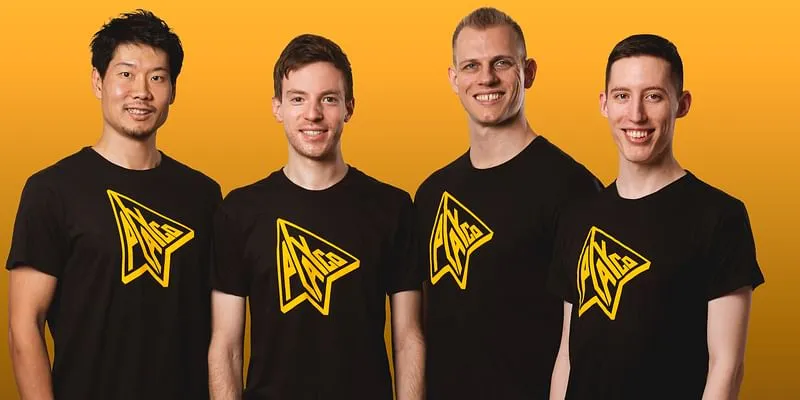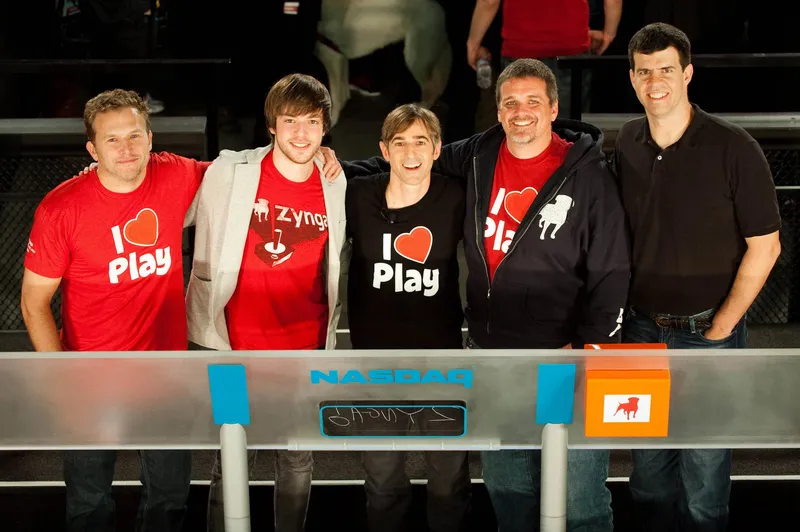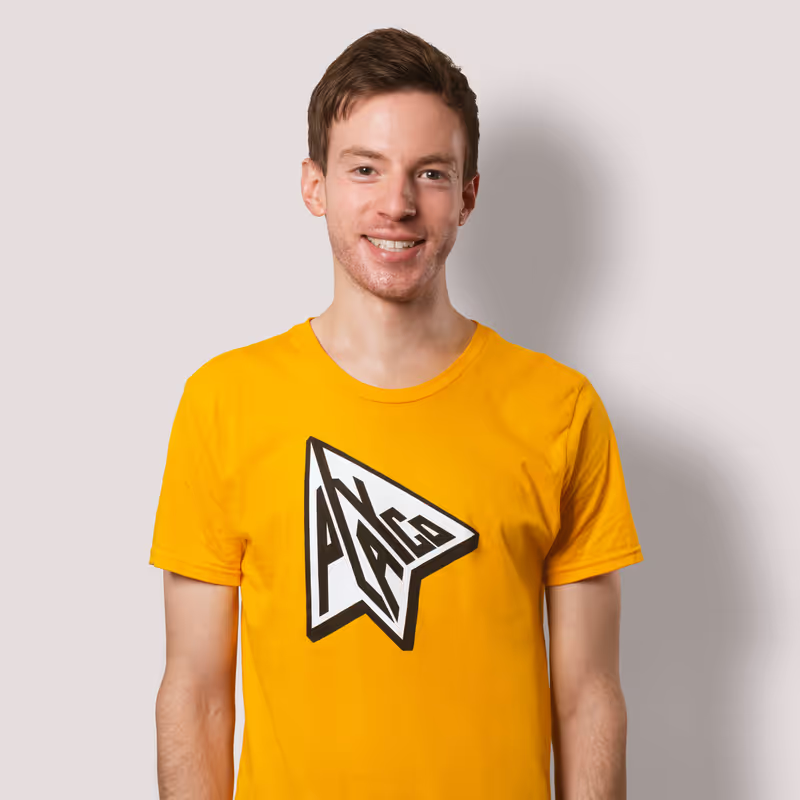Justin Waldron is no stranger to the global tech and startup ecosystem. After all, he is regarded as a pioneer in the social gaming world, having built and introduced the world to many a social game via Zynga — the social games developer he co-founded as a 19-year-old in 2007.
But as they say — in not so exacting terms — once a pioneer, always a pioneer.
And so, now, more than a decade later, Justin Waldron is back to building the “next big thing” in the fast-growing gaming industry with his latest venture PlayCo — the world’s first instant gaming startup that is creating games that people can play together.

Founding team at Playco
In fact, when Justin Waldron and his PlayCo Co-founder Michael Carter announced their latest venture in September last year, the instant gaming startup had already turned unicorn, having raised $100 million in Series A funding round led by Sequoia Capital and angel investor Josh Buckley with participation from other investors.
To be clear, while unicorns, or companies valued at over $1 billion, are no longer few and far between, PlayCo’s unicorn status at the Series A stage level speaks to the enormous confidence that investors have in Justin and the founding team’s vision and capability to build games across genres that billions of people can play together without requiring any additional app downloads.
“If you look at the types of games we are now building, we are building ones that no one has ever built before. So sometimes you have to figure out how you need to build something from the ground up,” Justin tells YS, as he details what it’s like to be a pioneer, building something for the first time.
Indeed, while Zynga had pioneered and changed the face of social gaming globally, Justin’s journey into the gaming industry had started long before Zynga.
The new world of social gaming
“I have always been a gamer since my younger days, and I would design and play multi-player video games with my cousins. I always found multiplayer games fun and saw these as the future of gaming. During my teens, the social media platforms started growing and I felt that there was a synergy between the two,” says Justin.
So when Facebook was launched in his college campus, Justin was the first to sign up on the platform and explore the different applications that could be built. He began by building simple applications on the platform.
One of the first things he built was a way for users to play games more easily with their friends who had Nintendo Wii. “You could key in your Wii Code and your friends online would get the code and you could play the game online together,” explains Justin.
This application caught the attention of Mark Pincus, who roped in Justin to co-found Zynga. Toether, they began building things more applications, the first of which was a poker game, for which Justin was the developer, designer, product manager and every other role rolled roped into one.
Needless to say, after that, Justin dropped out of college.
That poker game became the first big game on Facebook. It marked the birth of a new model in the gaming industry where games were free, social and on-demand.
“For seven years, I spent time at Zynga trying to focus on this model. I loved games, but I would be frustrated that I had to spend $50 on a game. I would read reviews and focus on buying the best games and still end up disappointed. So when there was this opportunity to build games for free and you spent money only when you’re enjoying the game, it felt fair,” recalls Justin.
It was a great way for developers and players to get their incentives more aligned, says Justin, who strongly believes that gaming allows you to create a world that people can spend time in and a context that allows them to have a good time while in it.
“It is one thing to put a smile on somebody’s face, but what got me excited was that technology allows you to do that at scale. You can make something that can make over a million people happy. I think that is a superpower. I don’t exactly remember what I first made, but that small simple game that somebody else enjoyed playing got me hooked,” says Justin.
In fact, this was what unique about Zynga. The team had given birth to a new idea and model for gaming by tapping the power of social networks.
Zynga’s games like FarmVille, which was designed to be played on Facebook before it was shut down in January 2021 after a strong 11 years stint, as well as those like Mafia Wars and Poker games all reached near-cult-like status, it took a lot of experimenting for Justin and team to crack into that model of in-game purchases.
“With Poker we saw people really liked the poker chips in the game. We would give them free chips but we thought, why not sell the chips? We then saw that people were buying the chips a lot more than we thought they would,” says Justin. This turned out to be a better revenue model than the ads-based one, and also gave rise to the idea of selling virtual items and products.
Still, in those early days, while the opportunities were tremendous, so too were the challenges of building everything from scratch.

The Zynga team
“When you wanted to set up servers for a game, you had to buy a computer and server and put it in a rack in a data centre. And when the game started growing, we had to get someone to go and buy servers and physically plug them in and make them grow. The idea of services for an internet company wasn’t heard of back then,” says Justin.
Today from servers to setting up to payment processing, everything is simpler. But that wasn’t the case back in 2007. “We hardly had anything available for payment processing for virtual items online. We had a 30-person team that was building software to process credit cards,” recollects Justin.
And yet, these challenges helped build a sense of resilience and a deeper problem-solving capability, believes Justin.
“That is important in a startup. You will have to solve a lot of problems yourself, and if you are doing something for the first time, there isn’t always something off the shelf that will do exactly what you wantSo sometimes you have to figure out how you need to build something from the ground up,” says Justin.
Today with the boom and growth in gaming startups and companies across the world, Justin says it is best to try and validate what you are doing as quickly as possible. In the gaming world, this means a willingness to sacrifice on a few things that may be important but which you don’t yet know if you need them to succeed until you test them.
“It is a common problem to assume success and build for 10 million users. It is a mistake. I like to find more ways to test what people are going to be interested in; what’s going to resonate with them and be fun and faster. So that by the time you have something out, you have a way of distribution along with a strong user base. I am more in favour of building things cheap and prototyping quickly,” says Justin.

Justin, the investor
One of the reasons Zynga was able to build multiple products is because the core team enabled people to build things on their own.
“Of course we would support them and share information across teams but what helped was this culture of allowing people to operate their own miniature companies inside of Zynga,” Justin recalls, something that’s not so common in many internet companies.
Perhaps, that’s why Justin found it “sort of natural” when he began investing in other startups, having already nurtured many mini companies within Zynga to build products from scratch and grow.
In fact, Justin wasn’t looking to be an investor, but as many of his Zynga colleagues began starting up on their own, Justin was keen to find a way to continue working with them.
As an investor, Justin is able to support them while learning about different types of companies in industries that he doesn’t have experience in but can draw parallels on what is followed in the gaming industry to help them on various aspects such as product development or analytics or even on business models.
“Gaming tends to be kind of ahead of the rest of consumer internet startups in consumer sector in general,” adds Justin.
What does the model say
As an investor, Justin also looks for differentiated business models, just like how Zynga created one for social gaming. In fact, it is the differentiation from an existing business model that continues to excite Justin now, just as much as it did when he was 19 years old. It’s a key criterion he looks for when investing in startups.
Citing the example of Lambda School, Justin says the startup has been able to change the way people look at education. The ISA (Income Share Agreement) model, where the skilling is free and the consumer pays only when they get a job, is a new model in the education industry.
“It is fair and native to the internet business model, where you prove value to the customer and then they pay you. Again you see that difference in Substack. It is a different way of looking at journalism and empowering more great writers, to be able to go build their own business,” says Justin.
What does the founder say?
Another important criterion for Justin the investor is the team.
“There is a huge opportunity in the world to create value by starting a technology company. The founders need to have insights and energy to go after the longer-term outcome. When you meet people like Lambda School Co-founder Austen Allred, you realise these are a different breed of people.Austen was living out of his car when he moved to San Francisco. These are people that let nothing get in their way of starting their company. Surrounding myself with people like these is inspiring,” says Justin.
Starting up again
When Justin and Mark started Zynga in 2007, Facebook had 20 million people. When Zynga IPOed in 2011, FB had 200 million users. Today, Facebook has over 2 billion users.
“Facebook has grown by 10 X, and the fact that no one has figured out how to build games that really are hitting that kind of scale has always been on my mind. There are many successful games, but these are still small compared with the number of people who can play today. And I think the reason is the way distribution works,” says Justin.
Most games are focussed on advertising, and most people aren’t willing to click on gaming ads. They are just interested in playing or having a great experience with their friends.
“If we could make games that people discover through their friends in places where they already spend their time, it can solve the problem and can even allow us to crack close to a billion users,” says Justin.
And that is what gave rise to the idea to build PlayCo, which Justin and his founding team announced in September last year.
People are looking for a differentiated experience as these have become increasingly rare and difficult to find, so the opportunity for entrepreneurs to build something unique has never been better, says Justin.
“The challenges are real. But when it comes to raising capital or hiring people there are no boundaries. We raised our capital from Valley investors, while being out of Japan. You don’t need to go to Sand Hill Road anymore to raise money,” Justin says adds about the startup’s decentralised model.
“The world is changing very quickly. Access, which was usually tied up with geographical boundaries, isn’t anymore. We at Playco too are hiring people from everywhere. There’s definitely always a home in our team for people that are thinking about starting up now or later in a few years. Start up if you are ready, or go somewhere where you can acquire the right skill sets,” Justin adds as he signs off.

![You are currently viewing [Techie Tuesday] From Zynga co-founder and startup investor to serial entrepreneur with PlayCo, Justin Waldron](https://blog.digitalsevaa.com/wp-content/uploads/2021/03/Techie-Tuesday-1615827917111.png)








